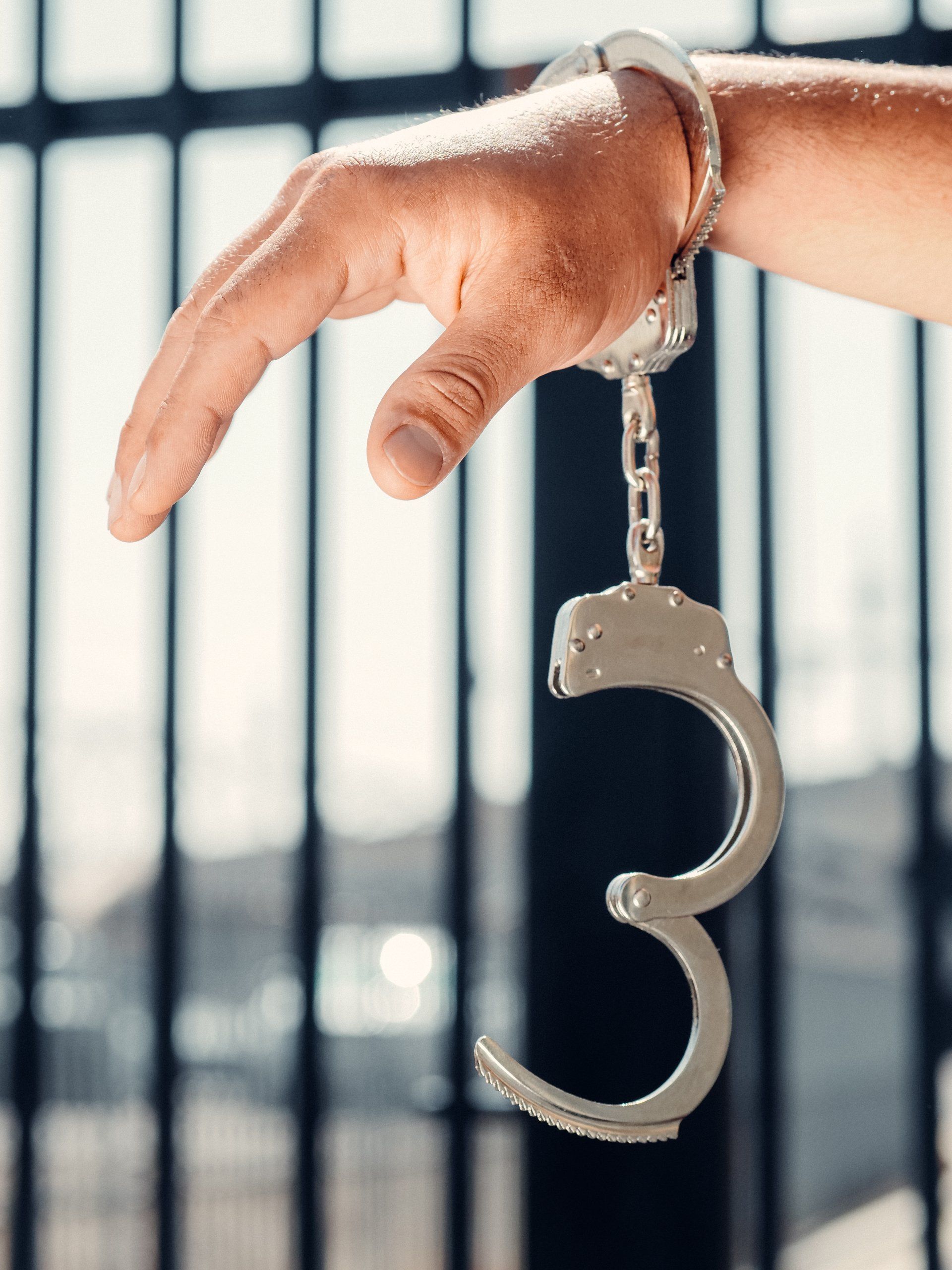Hello, I’m #46762.
I saw my parole officer a few weeks ago. There were a couple of things we disagreed on, and she said that I was entitled to my own opinion. If I go all out in sharing my opinion, some may think I’m an ex-con in revolt. You are the judge.
I’ve never had the right to vote, but I am forced to pay for all the dumb decisions your state government makes. Let me share three stories with you to clarify.
#1) Earlier this year, a man was released from prison after serving 20 years for having sex with a 17-year-old prostitute. At the time, he didn’t know her age. The judge was going to give him three years in prison, but he blew up at the judge. The judge got angry and blew up right back at him, sentencing him to 20 years in prison. Going from a three-year sentence to 20 years over an angry outburst seems very unjust when you consider the tax-payer consequences. It costs a little over $35,000 a year to incarcerate a man for one year. Those additional 17 years will cost an extra $595,000 that you and I have to help pay for.
#2) There is a prison for sex offenders in Mauston, Wisconsin, called Sand Ridge. The state calls it a Secure Treatment Center. It looks like a medium-security prison surrounded by high fencing and barbed wire.
An inmate there got busted with a small device that plugs into a TV to watch porn. They took his TV away from him for five years. The cost at Sand Ridge is $147,000 a year. After five years, that inmate gets his TV back. How many more years will he have to work before he is released? And how did he get that device in there? Either someone brought it in on a visit or a staff member gave it to him. As a result, we taxpayers get to pay $735,000 for his five-year misconduct incident.
The third incident is heartbreaking, costly, and corrupt. An inmate, Mike Crabtree, served over 30 years on a life sentence and was out at Oak Hill, a minimum-security prison camp with a fence around it. He was very close to being released.
Then the unthinkable happened. Mike mysteriously gets locked up and accused of making a threat against a member of the parole board. He is then transferred to the Supermax Prison in Boscobel, Wisconsin. About 25 days later, he goes before the hearing board on the conduct report. In the conduct report, it states that another inmate claims he overheard Mike say he was going to stab a member of the parole board. This threat supposedly took place in the church. Inmates must sign out before going to church. So was the snitch’s name last on the list, or was the name added days later? Was the second snitch’s name even on the list? If anyone had tried to stab a member of the parole board, they’d be caught instantly. In fact, they’d get a life sentence and may have to do it all in maximum security.
I like to look at issues from multiple angles. Mike is a devout Christian. He worked in the power plant back then and could have walked away at any time, but he was a trusted inmate and proved his trust in word and action. He’s had a good record. His goal was to be a prison chaplain. After the incident, he asked to take a polygraph test and have his accusers take one too, but prison authorities refused his request. Why? We don’t know.
At first, we were told it was one inmate who made the accusation, but why would someone make up such a big lie against a devoted Christian? Could he have shared Jesus with someone who had a deep hatred for Christians? Making up this big lie not only shut him up but also got him transferred out of there.
If some inmate was going to see the parole board, what a testimony he could give them by saying, “I overheard a fellow inmate say he was going to stab one of you, so I am reporting it. After all, isn’t saving your life worth parole? Now my life may be in danger too, so what are you going to do to protect me by saving yours?” A threat against a staff member means little to the parole board, but uncovering a threat against one of their own needs to be rewarded. Since very, very few parolees are granted parole these days, coming up with this lie might have been the perfect plan for parole that the parole board has ever seen.
Could it be that someone in authority fabricated the whole incident? Mike was working in the power plant, saw the parole board, and got a 12-month defer. Then someone in authority got him fired, saying, “You can’t work there if you’re coming off a 12-month defer.” Mike appealed his firing and got his job back because there was no record that he did anything wrong. Again, he was fired, and again, he filed an appeal. Evidently, that must have made someone insanely mad. I asked myself why that person in authority didn’t take Mike aside and said to him, “Withdraw your appeal or something bad will happen to you,” but they didn’t.
A conduct report was then written on Mike but later dismissed because, according to regulations, you need two inmate witnesses to make an accusation against another inmate. No problem; the captain rewrites the conduct report word for word and this time he supplies the name of a second snitch. Did the captain find a second snitch, make up a name, or just pick any inmate’s name to write down? No one knows the names of the snitches but the captain who wrote the conduct report and possibly others in authority. Maybe she was the one who got Mike fired.
Why couldn’t they ask each snitch if he would willingly take a polygraph test?
In the meantime, Mike was sent to the Supermax Prison and then moved to Waupun Correctional Institution for nearly three years.
Mike declined to see the parole board while in maximum security. After he was transferred to a medium-security prison, he saw the parole board. They gave him another three-year deferment. Then someone in Madison mysteriously changed the records to four years—that's seven years.
So who’s lying? Mike, the snitches, or the captain? And why don’t authorities search for the truth?
My plea is to have an honest person contact the authorities at Oak Hill Prison Camp and get the names of the two snitches. Most likely, they’ve been released by now. Contact each one and ask two questions: Is it true you snitched on Mike Crabtree when you were at Oak Hill? If both answer yes, then ask if they are willing to take a polygraph test. If both deny snitching, then was the captain motivated to lie? Was the captain pressured to put an end to Mike’s appeals? We want the truth to come out. If it doesn’t, we have to spend hundreds and thousands of dollars to defend Mike’s frame-up, because that’s exactly what it was.
Think about it: if a black inmate accused a white prison guard of calling him the N-word and another two inmates also said they overheard the guard call him the N-word, I think most would agree that the guard should be fired if it were true. But what happens if the guard says it isn’t true and says, “I want to take a polygraph test and want those three inmates to take one too?" At that point, firing the guard would be totally wrong. The right thing to do is to ask each inmate privately if he is willing to take a polygraph test. Usually, the guilty party will refuse the test.
In this case, Mike Crabtree asked to take a polygraph test and for his accusers to take one too. Friends of Mike are willing to pay for each test because we know Mike is innocent, but how does one prove it? If the story was fabricated, authorities may destroy the record of the snitches. Or, worse yet, kill off the men who supposedly snitched. That’s the way things subtly happen behind bars. Presently, Mike is doing an additional seven years because of one lie, and we don’t know how many more years there will be after that. But this defamation of Mike’s character is a major crime.
If someone made a threat against the president or a governor, they would get a fast-track real trial, not a predetermined outcome trial in front of a parole board, and if found guilty, most likely they’d get a lesser sentence.
Proving Innocence
Over the years, a number of men have been wrongly convicted of rape. Only with DNA testing were they proven innocent. So what does an innocent man say when he sees the parole board? He might say, “I’m telling you, the honest God, fearing the truth, I didn’t rape that woman. I don’t know that woman.” Yet the parole board may see him as a dirty, filthy, lying rapist worthy of doing the maximum amount of work they can make him do when in reality, he was arrested and prosecuted based on mistaken identity. He happened to be in the wrong place at the wrong time, and the officer who arrested him thought it was the right person when it wasn’t. So if you’re innocent, how would you defend yourself? How? Think about this. The guilty can acknowledge their guilt, say how sorry they are, and be in a better position to get parole than the innocent person.
So how does Mike defend himself against a fabricated lie?
Alcohol Consumption
Wisconsin passed a law clamping down on second-degree drunk driving penalties, which makes it a possible felony. The last time I got drunk was on my homebrew while in prison, so I have a few questions: Do you want to brand someone a felon for life if they have a blood alcohol content of.08? Don’t most accidents happen at 2 or 3 times that amount?
They say alcohol is a drug. If so, why don’t manufacturers print the side on the containers and state the dangers in commercials? Excessive drinking does have the potential to cause sexual assaults, wife beatings, and other violent behavior, to name just a few. I know. I’ve seen it. And that’s why I ended up in prison.
Some people go out drinking with a friend. They take turns buying drinks. On the way home, the driver is stopped for drunk driving. Shouldn’t the friend be charged with aiding and abetting in drunk driving since he aided and abetting in getting the driver drunk?
One thing I am totally opposed to is for the state to increase the penalty for those convicted of drunk driving 20 days or 20 years before a new law is passed. Wisconsin has been known to do that.
Back in the year 2000, Wisconsin started Truth in Sentencing. If someone got a 10-year sentence, they did 10 years. Only people convicted before 2000 and those convicted of murder are now eligible for parole. Because the prison population is exploding, there are over 23,000 inmates. Those who could be paroled are about 3000. However, if you put yourself in the place of a member of the parole board and grant more paroles, you threaten your job security. It would be interesting to know when a new parole member is hired if he or she is told that if you want to keep a job, you must grant very few parole.
Before the year 2000, more people were granted parole after spending less time on their sentences, but after 2000, more inmates had to spend more years behind bars. Inmates convicted before 2000 under the old law should rightfully have their cases processed according to the old law mandates, but the lines are blurred right now. If over the last 18 years, only 5000 inmates had to spend an extra two years in prison, that would cost us $350,000,000. If 10,000 inmates had to do an extra three years, the cost would be $1,050,000,000. Some may be working an extra 10 or 20 years. The truth about sentencing is that it only applies to those who were convicted after 2000. Making those convicted before 2000 do a larger portion of their sentence is wrong.
Before the year 1990, people on parole did not have to pay any supervision fees. Then the law changed around 1990. Then everyone on parole had to pay $20 a month. The actual amount was based on your income. As your income increased, it jumped to $40 per month. This was not a part of the punishment handed down by the judge in the courtroom. The state increased the punishment without prior notification or a trial. At first, we had to call a certain phone number from a ground line, and the fee would be deducted. Then they said they would accept money orders. And now, if you don’t pay it, they automatically deduct it from your income taxes. The problem is, if you are married, your spouse is equally penalized. Rightfully, the state needs to give that money back to those sentenced under the old law.
In the late 1990s, Wisconsin passed a law that gave the state the power to take a man convicted of a sexual assault who had completed his time in prison and further incarcerate him at Sand Ridge indefinitely. His evaluation is based on humanistic theory, which defies God’s healing power to change heart and soul and withholds releasing him under the pretense that he could possibly commit another such crime. This law includes those convicted decades before it was passed. Again, how can they do this? I thought someone had to be proven guilty beyond a reasonable doubt based on factual evidence. If a person spent 20 or more years in prison, don’t you think they have changed? When other nations do some of the stuff our state does, we condemn them for human rights violations.
What happens if this incarceration is proven illegal and the state is ordered to compensate all those wrongly committed to Sand Ridge? I suppose taxpayers will have to help pay for that too. The longer you wait, the higher the compensation will be. Now it’s probably between $50,000,000 and $100,000,000. Sand Ridge was built in 2000 for violent sex offenders. Since its opening, there have been about 650 men incarcerated and about 350 still remaining. About 300 were released in over 18 years. Some have been there since the place opened.
They have the same problem as the parole board. If they release too many, the place may have to close down, and the people working there would lose their jobs. Their salaries must be higher since the cost per man per year is $147,000.
Some men at Sand Ridge are old and disabled. I don’t think any woman has to be afraid of them. They do provide geriatric care for them for $147,000 a year. If they were to release them, then they would have to keep others longer.
The state sends some sex offenders to Sand Ridge after they finish their stay in prison. Why not send them there five years earlier for treatment? They would still be confined in prison and could get out five years earlier, thus saving taxpayers money.
Once released from Sand Ridge, they are either discharged or placed on supervision with an ankle bracelet. The state provides them with a house to live in. They are not permitted to leave the house unless their monitor is with them. A monitor is their slave master. One man loved gardening and left the house to go work in his garden. He was sent back to Sand Ridge for going outside. So who takes out the garbage? A case worker goes to the store with them, takes them to appointments, and monitors their movements outside, while some can drive to and from work since the monitor is timed and attached to their ankle. But sadly, they are restricted from spiritual fellowship with others. As a result, some become suicidal due to confinement restrictions.
Does the state place two child rapists in one house and two woman rapists in another? Couldn’t one corrupt the other, and all that time at Sand Ridge would have been wasted? If they spent seven years at Sand Ridge, that’s over $1,000,000 down the government’s toilet.
Does the state plant listening devices in the houses when they’re gone and pick them up another day when they’re gone?
The big question: Why is the supervision fee for one year $119,000? Who wouldn’t want to be a case monitor for two men for $238,000 a year, minus the rental of the house?
One thing I would do is start a faith-based treatment program for drugs, alcohol, sexual crimes, and other problems prisoners may have.
My Story of Deliverance
When I first entered prison, I was pretty much obedient to the rules. Two years later, my appeal was denied. That really hurt. Shortly after that, I started making homebrew. Getting drunk was a good escape from the reality of my prison cell. Then I got busted a few months later. Then I found a better way to hide it. I had half a gallon each week—a quart on Friday night and one on Saturday night. This went on for over a year before I got busted again. Then I started smoking pot at night. Very seldom would I smoke it during the day.
My appeal was going to be heard soon, so I filed for clemency through the governor. I had pretty much-lost trust in the justice system by then. I had a rope and hook and was transferred to the dorm. If all fails, I thought, I will escape over the wall. Then my appeal was shot down, and my clemency was denied. At 3:30 in the morning, I tried going over the wall. My rope broke mid-air. I didn’t get hurt from the fall. Part of the rope was left hanging from the top of the wall. I rushed back into the dorm and slid into bed on the second floor without getting caught. This was a Friday. That afternoon, I took the rope and flushed it down the toilet. That evening, the toilets backed up, so I went to recreation.
Monday morning, a guard had me striped and searched but didn’t find anything. Another guard went through all my personal property and found $210 and a temporary driver’s license. I was thrown in the hole for the contraband. I found out that my friend snitched on me and got moved out to a prison camp. When I got out of the hole, I determined not to trust anyone but my pot and my homebrew. The reality of my life sentence weighed heavy on me. I believed my conviction would be overturned, and now, with my failed escape, life was bad. My heart grew very cold, and my need or want for pot and homebrew increased. My next-door neighbor was on a special diet, so he went to the kitchen early for meals. He’d bring me back sugar for my homebrew. I figured that if the state drove me to drink, the least they could do was provide the sugar. I got drunk twice on weekends and had a little extra when I smoked pot. Now I started to smoke pot a few times a day.
I had one goal, and that was to escape. After a while, I got some hacksaw blades. Now I couldn’t find anyone I trusted to escape with me. One guy was interested and talked of doing armed robberies and shooting people. I couldn’t accept him as a partner.
Then I got busted with some pot. I was locked in my cell until the disciplinary hearing that afternoon. Would the guards tear my cell apart when I went to the hole? I hated the thought of dumping my homebrew. Then a guy from the print shop where we worked stopped by. I had him step away as I got out of the house. We each had one glass and then another. After that, I decided to take the risk with the homebrew. A couple of months later, I did get busted with three gallons of homebrew.
I started smoking pot more often; I needed to get high to get my head out of the gutter for a couple of hours. I was sinking ever lower. I was full of hatred, hopelessness, and despair. Every morning I woke up coughing, gagging, and gasping for air. I struggled for each breath before coughing it all out. This was a living hell for me. One day, as I walked down the tier, a feeling came over me like I had one foot in the world of insanity. If I didn’t escape soon, I would be going insane.
I began talking to God. At first, it was more complaining and then more asking for help. I told him I was sorry and felt better. A few days later, my friend said he’d escape with me. We set the date for January 31, 1978, at 3:30 a.m. I thought it was an answer to prayer. We each sawed out two bars in our cells and crawled around to the end of the cell block. Our plan was to get over onto the hearing duck, climb up onto the heating unit, remove the clean-out door, climb inside, cut out two bars, and climb down to freedom. Two years earlier, I worked in the sheet metal shop, and we cut in the openings, made the clean-out doors, and installed them. My friend climbed onto the heating duck, and the lights in the cellblock started to go on. We hurried back to our cells and put the bars in. At first, the guards were running their hands across the bars of cells on our tier. When the guard came to my cell, one of my bars fell out. More guards then hurried into our cellblock with hammers and started pounding on each bar of each cell. Two guards took me to the segregation unit. As I lay down on my bunk, I looked up at the ceiling, and the words “God is my Father" were written there. Those words just burned into my heart. Somehow, I felt something good was going to come out of this.
The next day, we were given conduct reports, transferred to Waupun Prison, and put in the segregation building. It was here that God really started working in my life.
When I was first arrested, I read the New Testament. That was over thirty years ago. Now these words became fresh in my heart: “Come to Me, all you who are weary and burdened, and I will give you rest” (Matt. 11:28). I gave my life to Jesus and received Jesus into my heart. I experienced a new freedom with a heart full of peace and love.
A few months before our escape attempt, someone threw a book into my cell called “God’s Prison Gang” by Chaplain and Walter Wagner, and I threw it up on my shelf. Now I began to read it. It’s a book about several convicts who gave their hearts to Jesus. All of them experienced the love of God and His forgiveness. The Bible calls this being born again. Those convicts and I were all born again and have become children of God. We have His promise of eternal life.
Two weeks later, we were taken back to Green Bay for a hearing on the conduct reports. They gave me Program Seg, which meant they could keep me in segregation for a year. As soon as I got back to Waupun Prison, I made up a pitcher of homebrew. A couple of days went by when God impressed upon me to dump it out. I told God I wasn’t going to get drunk, but only have a glass or two a night. This went on for another day or two, and then I dumped it down the toilet.
A week later, I was moved to North Seg, which is a step up in the world. A week after that, I was moved into an unassigned apartment, three cells away from one of the strongest Christians there at Waupun. He gave me my first Bible, and as I started to read it, it just came alive. It really is the Word of God. I spent over a year unassigned studying His Word and getting to know God better.
They gave away rolling tobacco in prison, so I kept smoking. I noticed that tars were building up around the grove in the ashtray that held my cigarette. I thought, if it’s doing that to the ashtray, what is it doing to my lungs? I asked Jesus to take away my habit, and He did it instantly. There were no withdrawals at all. My problem was that I liked smoking. Each time I lit up after that, I felt like I was sinning. After three days, I completely quit. I’ve been out for almost 35 years and have never drunk alcohol, smoked pot, or smoked cigarettes since. All thanks to my God. This is my story of deliverance, or my faith-based treatment program.
When a person becomes a born-again Christian, they are a new creation with a new set of values. For some Christians, when they get released, they may think they can go back and drink or smoke moderately. Some may choose to get totally drunk and commit new crimes. However, a faith-based treatment program with some training can bring great success.
Alternatives for a Better Life
The state has halfway houses where some ex-cons go who don’t have anywhere else to go. I’d start halfway home. There is a man outside of Fort Atkinson who takes in ex-cons from the county jail. He gives them a place to stay, helps them find a job, takes them to and from work, and helps them find a car. These ex-cons from jail are halfway home. Soon, they'll be able to move out on their own.
There are two prisoners I visit that I’d be willing to take into my home, help them find a job, and help them become productive members of society. What would happen if we released prisoners six months, a year, or even a couple of years earlier to a halfway house? Remember, it costs $35,000 a year to be in prison. If someone with a halfway house took in an ex-con, helped him find a job, and became a productive member of society, we could reward him. A man released from Sand Ridge costs taxpayers $119,000 a year for supervision in a house with another sex offender. Is this insanity? Wouldn’t a halfway-home environment be much better?
Another thing I’d do is do away with supervision fees. If 100 men are released from prison and are required to pay the supervision fee when they get a job, what happens when not all of them are able to find work and have no money to pay their fees? They become desperate. The state can provide them with a place to stay, food stamps, and free health care. A number of these guys will use drugs, and some will sell drugs. When they fail a drug test, they may be sent to prison for three years. Let's do the math: $20 a month is $240 a year, and 100 is $24,000. $40 a month is $480 a year, and 100 is $48,000. One man going back to prison for three years is worth $105,000. If 10 men go back for three years each, it comes to $1,050,000. If some go back for new-armed robberies they commit, who knows what that’ll cost? The conclusion I come to is that the supervision fee is beyond stupidity. By dropping the supervision fees, we’d enabled more ex-cons to want to become productive members of society and get their feet on the ground.
When a person gets out of prison, the first year is the hardest readjustment period for staying out. After three years, he has over a 95% chance of staying out. After five years, he has a 99% or better chance. What I would propose is dropping parole officer visits after five years for all with a good record. They’d be on what I call unsupervised parole. They can go anywhere and do anything they want. If they commit a new crime, then their parole would be revoked and they would face additional time for the new crime. After 10 or 20 years, the parole would be totally dropped, and the ex-con would be free.
Should juveniles be waived into adult court? We need to take their age into consideration. What if 18% a year (1-1/2% a month) would be dropped from the sentence for each year under 18? If he faced a 40-year sentence, a 17-year-old could face a maximum of 32.8 years; a 16-year-old, 26.6 years; and a 15-year-old, 19.4 years.
Another thing that could be done is to treat juveniles as juveniles with adult parole. They’d spend their time in a juvenile prison. When they get out, they would have 5 or 10-year parole to do as adults. If they mess up, to an adult prison they would go.
A few years ago, two 12-year-old girls from Waukesha stabbed their friend, attempting to kill her. They claimed Slender Man came alive and told them to kill her, and he (Slender Man) would reward them for living in his mansion. Both girls were waved into adult court and ended up not guilty for reasons of insanity. Are we to believe both girls went insane at the same moment? If they got on some bad drugs, maybe. How can two healthy girls go insane at the same moment and in the same way? That’s impossible. Perhaps the psychologists were atheists. For them, there is no God, and there is no devil or demon. The only conclusion they could come up with was that both girls were insane.
Both girls are probably normal now, and they’ll remain normal under supervision. If the psychologists went online in hopes of getting Slender Man to come alive, they don’t think that would happen. Jesus talks about the devil as a deceiver, a thief, a murderer, a liar, and a destroyer. Jesus never said the devil was stupid. But if one of the girls were released and again tried to contact Slender Man, he could come alive for her simply because she already opened that door. Could something much worse happen then? She needs a godly psychologist who can look at it from a biblical angle.
The Bible talks about a similar incident. When God created Adam and Eve, he placed them in the Garden of Eden. They could eat every tree in the garden except the one in the middle of the garden. God wanted to test their loyalty.
A couple of weeks may have passed—we don’t know for sure—when Eve was by the tree in the midst of the garden. Suddenly a serpent started to speak to her: “Did God really say you must not eat from any tree in the garden?” Eve answered, “We may eat fruit from all the trees in the garden, but God did say you must not eat fruit from the tree in the middle of the garden, or touch it, or you will die.” The serpent answered Eve, “You shall not surely die, for God knows that when you eat of it, your eyes will be open, and you will be like God, knowing good and evil.” So Eve took the forbidden fruit and ate it, and she didn’t die at that moment.
Both girls heard Slender Man speak to them, just as Eve heard the serpent speak to her. Most of us know Slender Man can’t talk, but the serpent of deception can whisper in our ears and mislead our thoughts. Were all three girls insane? No. The devil spoke through Slender Man as he spoke through the serpent. Both girls were promised a great reward: to live in a mansion with Slender Man. Eve was promised that she would be like God. Both girls and Eve did something really, really wrong. They believed a lie. The girls believed they had to kill their friend to gain glory, and Eve acted out of disobedience to what God told her, which brought death to all humanity. Jesus calls the devil a murderer from the beginning.
Florida had a mass shooting at a school just over a year ago. They had the shooter in an interrogation room by himself. He kept babbling on to himself, “Kill, destroy, kill, destroy.” Jesus says the devil comes to kill and destroy. Was the shooter demon possessed or strongly under his power?
Why do we have so many mass shootings today? Sixty years ago, you rarely heard of that. Sixty years ago, almost everyone could buy a gun. Sixty years ago, most Americans believed in God and that there would be a future judgment. That’s no longer true today.
Children today are brainwashed into the evolutionary theory of humanism. A popular saying among our youth is “You only live once." It’s no longer a Biblical question of right and wrong, but rather, is it right for me or not? That’s the new right and wrong.
These incidents happen in the Milwaukee area.
• A man attempts to drive off after putting $22 of gas in his SUV. The owner steps in front of his vehicle. In order not to get caught, he runs the man over and kills him. He gets away but is later caught.
• A lady has her nails done and runs out without paying the $35 bill. A woman runs out in front of her car to stop her. The lady in the car runs her over and kills her. She, too, is later caught.
• A man shoots a city inspector and steals his car. All the police will have their eyes out for that car. He’s later caught.
• In northern Wisconsin, a man sees a girl he wants, so he kills her parents and abducts the girl. The girl escapes, and he’s arrested. He admits to everything.
• A man from Colorado kills his pregnant wife and his two daughters.
If there is no God, if they see no value in that life, and if they see a reward for themselves, then in their eyes it’s okay to kill.
Several years ago, I had to repair some steps, and the mosquitoes were terrible. I see no value in the life of a mosquito. I kill them if they land on me. My reward for killing a mosquito is not getting bit. This seems right to me. Some people view other people like I view mosquitoes.
Our prisons are overcrowded. One thing I find cruel is doubling up inmates in a 5- or 6-foot-wide cell with a toilet and sink for 24 hours a day. If you need to double up, do so at a medium-security camp where the rooms are much larger and you’re free to leave the room all day and in the evenings.
Perhaps the biggest danger to overcrowding is that there are not enough jobs to go around. Some inmates sit around doing nothing but watching TV, playing cards, or visiting other inmates. The state pays them 5 cents an hour. This is beyond stupidity. One thing prisoners need to know is that if you want something, you’ll have to get a job and earn some money. Some inmates had a job before entering prison. If they don’t learn how to get a job and keep it in prison, what are their chances once they are released?
Here’s my solution. Expand the medium camps and allow outside businesses to move in. Inmates could get a real job and earn some real wages. The state could take part of the wages for room and board. If an inmate could make $4 or $5 an hour, think of the money he’d have once released. If he had $5000 to $20,000 upon release, plus working experience, he’d be able to buy a car, rent an apartment, and support himself. I knew a man who was out only a short time and returned. I asked him why. He said all his friends had cars and stuff, and he had nothing. An ex-con getting out on his feet is more likely to make it.
I know a man who had sex with a child a decade’s age. He was 18, and she was 17 and 1/2. He spent three years on probation. He’d like to get his felony dropped so he could own a rifle and go hunting. All his appeals for clemency have failed. That happened over 40 years ago. Why can’t the state restore people like him to full rights as citizens?
Thank you for reading this ex-con in revolt. Our government has wasted so many millions of dollars in the past and continues to do so. They have changed laws for their own liking, which I believe are illegal. Most of all, Mike Crabtree has experienced such a criminal act against him, possibly by the DOC. Feel free to share my blog with your friends. Maybe if more people knew, the state would take action (hopefully not against me). I mailed a copy of this ex-con in revoke to our governor, Tony Evers.
PS: I never had the right to vote, but as a taxpayer, I’m forced to pay for all the dumb decisions your federal government makes. To be continued: MAYBE.








